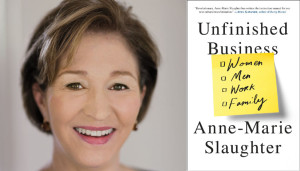Anne-Marie Slaughter “Unfinished Business”
 Sheryl Sandberg and I agree on many things. We both encourage women to speak up and take their place at the table; we both want to see many structural changes in the workplace. To some extent the difference between us is largely a matter of which side of the equation to emphasize — a difference that, on my side, at least, is a function of relative age. I would have written a very similar book to Lean In at forty-three, Sandberg’s age when she published her book. My kids were very young and I had never met a work-life challenge that I could not surmount by working harder or hiring people to help out. By fifty-three, when I wrote my article, I found myself in a different place, one that gave me insight into the circumstances and choices facing the many women who have found that for whatever reason, leaning in simply isn’t an option.
Sheryl Sandberg and I agree on many things. We both encourage women to speak up and take their place at the table; we both want to see many structural changes in the workplace. To some extent the difference between us is largely a matter of which side of the equation to emphasize — a difference that, on my side, at least, is a function of relative age. I would have written a very similar book to Lean In at forty-three, Sandberg’s age when she published her book. My kids were very young and I had never met a work-life challenge that I could not surmount by working harder or hiring people to help out. By fifty-three, when I wrote my article, I found myself in a different place, one that gave me insight into the circumstances and choices facing the many women who have found that for whatever reason, leaning in simply isn’t an option.
Anne-Marie Slaughter’s Unfinished Business was published in 2015. It is a book based upon her extremely popular article published in the Atlantic in 2012, “Why Women Still Can’t Have it All” (July/Aug 2012, http://www.theatlantic.com/magazine/archive/2012/07/why-women-still-cant-have-it-all/309020/ ). It went viral. Three years later this book was published and another article in the Atlantic. This time by her husband, Prof. Andrew Moravcsik called, “Why I Put My Wife’s Career First” ( Oct 2015, http://www.theatlantic.com/magazine/archive/2015/10/why-i-put-my-wifes-career-first/403240/ ). She also did a TED talk in 2013, ‘Can we all “have it all”?’ ( https://www.ted.com/talks/anne_marie_slaughter_can_we_all_have_it_all?language=en ).
Of late there have been many conversations about women, feminism, the work and home balance etc. Many puritanical feminists firmly believe that men should do their share of household chores and chipping in with parenting etc. Many women are made to feel wretched for not being professional enough at work if they mention their children and family responsibilities as being of concern too. Many women are denied opportunities to grow professionally for being mothers and having a family. Being a single woman or preferably a woman without children raises the chances of professional growth exponentially. But seriously, is it important to lean in so much that either work or family suffers? Why cannot it all be seen as a slow dance that evolves and grows?
Anne-Marie Slaughter’s Unfinished Business is the feminist bible for now. Another text may come along and replace it very soon given with what speed content is being uploaded on the internet. But for now this book works wonderfully well. Its arguments about striking the balance, importance of family and institutional support for working women, essential to have male role models like her husband who opted to look after the children without any hassles and of keeping egos at bay. Many marriages fall apart since it is so deeply ingrained in society that the man should be earning more than the wife and if roles are reversed, even when the husband is supportive, societal pressure can get to be so much that it puts undue stress on the relationship.
Personally I feel that many of the institutional structures are based on a very fixed linear notion of how time operates, inevitably a patriarchal construct. Whereas most women work on “stolen time” especially when there are children involved and they are the primary caregivers. Alas, it is this masculine interpretation of time as being linear that dominates our daily function. Motherhood is a slow, nurturing process and sometimes it is the mother’s presence that is required more than the father’s — an argument that may not go well with too many traditional feminists. Similarly with work responsibilities and one’s career. But it is true. Feminism is not simply about being empowered by acquiring more masculine characteristics to prove that irrespective of being born a woman, you can do everything on an equal if not a better footing than a man. Modern day feminism is about being an empowered woman who has the ability to voice her opinion, make her choices and stand by them. Women negotiate and make choices on a daily basis in whichever space they inhabit. This is why Unfinished Business is relevant for everyone.
Read it.
Anne-Marie Slaughter Unfinished Business Oneworld Publisher, London, 2015. Pb. pp. 330. Rs 499
24 February 2016
